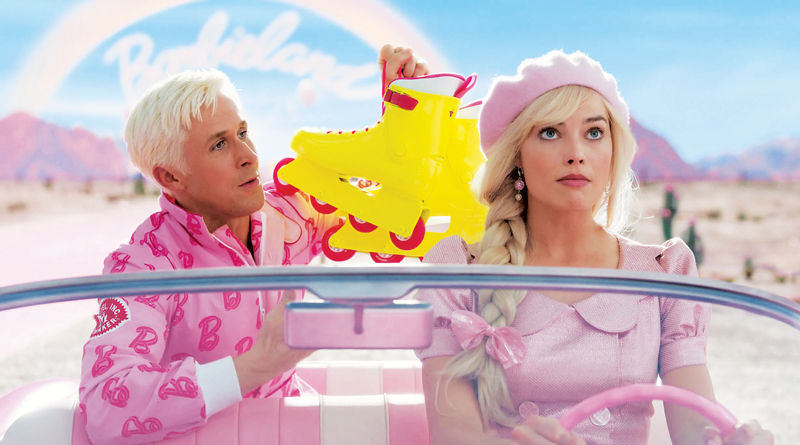“Barbie” Takes On Too Many Jobs ~ At The Movies With Kasey

“Barbenheimer” has come and gone, and although I only saw Barbie, in my opinion, the optimal lineup started with coffee and Oppenheimer, followed by a fun lunch and Barbie to lift the spirits. When I saw Barbie I found that the feature, based on the iconic doll, left me with more mixed feelings than I anticipated. The film responds to critiques of the doll while also celebrating a vision of who Barbie’s inventor, Ruth Handler, dreamed her to be. The film thus contains a curious mixture of sincerity and satire, offering plenty of laughs, but also moving moments struggling with the complexities of the human condition.
In Barbie, “Stereotypical” Barbie (Margot Robbie)—the Barbie you think of when someone brings up the doll—lives in Barbie Land with all the other Barbies (Issa Rae, Alexandra Shipp, Emma Mackey, Hari Nef, Sharon Rooney, Ana Cruz Kayne, Rita Arya, Dua Lipa, Nicola Coughlan). Every day is perfect until Barbie starts thinking about death and wakes up to morning breath, a cold shower, and flat feet. The other Barbies send her to Weird Barbie (Kate McKinnon), who explains that a tear must have developed in the membrane that divides Barbie Land from the Real World, and the thoughts of the child playing with Barbie are leaking through.
Barbie must go to Los Angeles to find whoever is playing with her (America Ferrera and Ariana Greenblatt), setting things right again. Unfortunately, Ken (Ryan Gosling) insists on tagging along and discovers patriarchy, attempting to bring it back to Barbie Land.
The first act of Barbie exquisitely develops Barbie Land and the Barbies’ belief that the can-do femininity the doll represents fixed everything for women in the real world. Once Barbie makes it to Mattel headquarters, the storytelling wobbles on its heels. As CEO, Will Ferrell gives a dull performance, and the overall tone of the Mattel scenes veers toward slapstick, tonally mismatching the rest of the picture. Then, there’s the joke made by paper-pusher Aaron Dinkins (Connor Swindells) when Barbie struggles to find a woman working at the company. He chimes in, “I’m a man with no power, does that make me a woman?” It felt like the air went out of the theater. With Ken on the street discovering patriarchy by watching how executives treat their secretaries, such a heavy-handed joke was unnecessary to establish the gender imbalance Barbie finds in the real world.
Once back in Barbie Land, the screenplay tries too hard to accomplish too many tasks. Barbie is made to apologize not only for failing to fix gender inequity but also for making girls feel bad about their bodies. Still, she also must pull through an existential crisis to help save the day. Although America Ferrera delivers a stirring monologue about the cognitive dissonance of being a woman (and kudos to Gerwig & Co. for using that phrase in a movie about Barbie), the screenplay seems to overcompensate, taking apologies for the doll too seriously.
Greta Gerwig told Rolling Stone that she had to fight to keep a scene in which Barbie sits at a bus stop and watches people around her experience raw, ordinary human moments. Moved to tears, she sees an older woman on the other end of the bench. They make eye contact and Barbie tells the woman, “You’re so beautiful.” She replies, “I know it.” To Gerwig, that was the heart of the movie, and I agree that simpler moments carry more weight in the film’s arguments about Barbie, femininity, and humanity than the overt declarations about patriarchy.
That said, Barbie still provides a fun interpretation of the doll. The creation of Barbie Land was a creative feat with inventive sets, lighthearted representations of child’s play, and an incredible wardrobe. Margot Robbie is perfect as Barbie, sweet and naive, but without making the doll vapid. I could not think of a better Weird Barbie than Kate McKinnon, who brings all-in energy to her projects. I also enjoyed Rhea Perlman as Ruth Handler. As Ken, Ryan Gosling performed a fun blend of humor and vulnerability but is at his best when the Kens go to war, culminating in a heartfelt musical number.
Ultimately, the obvious creative care, cleverness, and performances in Barbie outweigh my critiques of the screenplay’s heaviness. Furthermore, as I found with Ghostbusters and Wonder Woman, my inner-child was moved to sit and watch a blockbuster made by women for women, speaking to our experiences, while finding joy in creativity. You cannot put a price tag on that, but Margot Robbie’s one billion dollar estimate sounds right.
Barbie was directed by Greta Gerwig, who wrote the screenplay with Noah Baumbach. It runs 114 minutes and is rated PG-13.
- “Inside Out 2” Triumphs! : At The Movies With Kasey - July 19, 2024
- ‘Am I OK?’ Celebrates Late Blooming: At The Movies With Kasey - July 5, 2024
- ‘Hitman’ Is A Miss: At The Movies With Kasey - June 21, 2024


